The right NLP Engineers are at the heart of developing systems that enable machines to understand and respond to human language. Their work is crucial in creating more intuitive and effective interactions between computers and humans.
NLP engineering skills encompass a range of competencies from linguistics and computer science to machine learning techniques. Mastery in programming languages such as Python, and understanding of natural language processing libraries and frameworks, are fundamental.
Candidates can write these abilities in their resumes, but you can’t verify them without on-the-job NLP Engineer skill tests.
In this post, we will explore 9 essential NLP Engineer skills, 10 secondary skills and how to assess them so you can make informed hiring decisions.
Table of contents
9 fundamental NLP Engineer skills and traits
The best skills for NLP Engineers include Programming, Machine Learning, Text Preprocessing, Statistical Analysis, Deep Learning, Linguistic Knowledge, Data Visualization, Model Evaluation and Natural Language Understanding.
Let’s dive into the details by examining the 9 essential skills of a NLP Engineer.
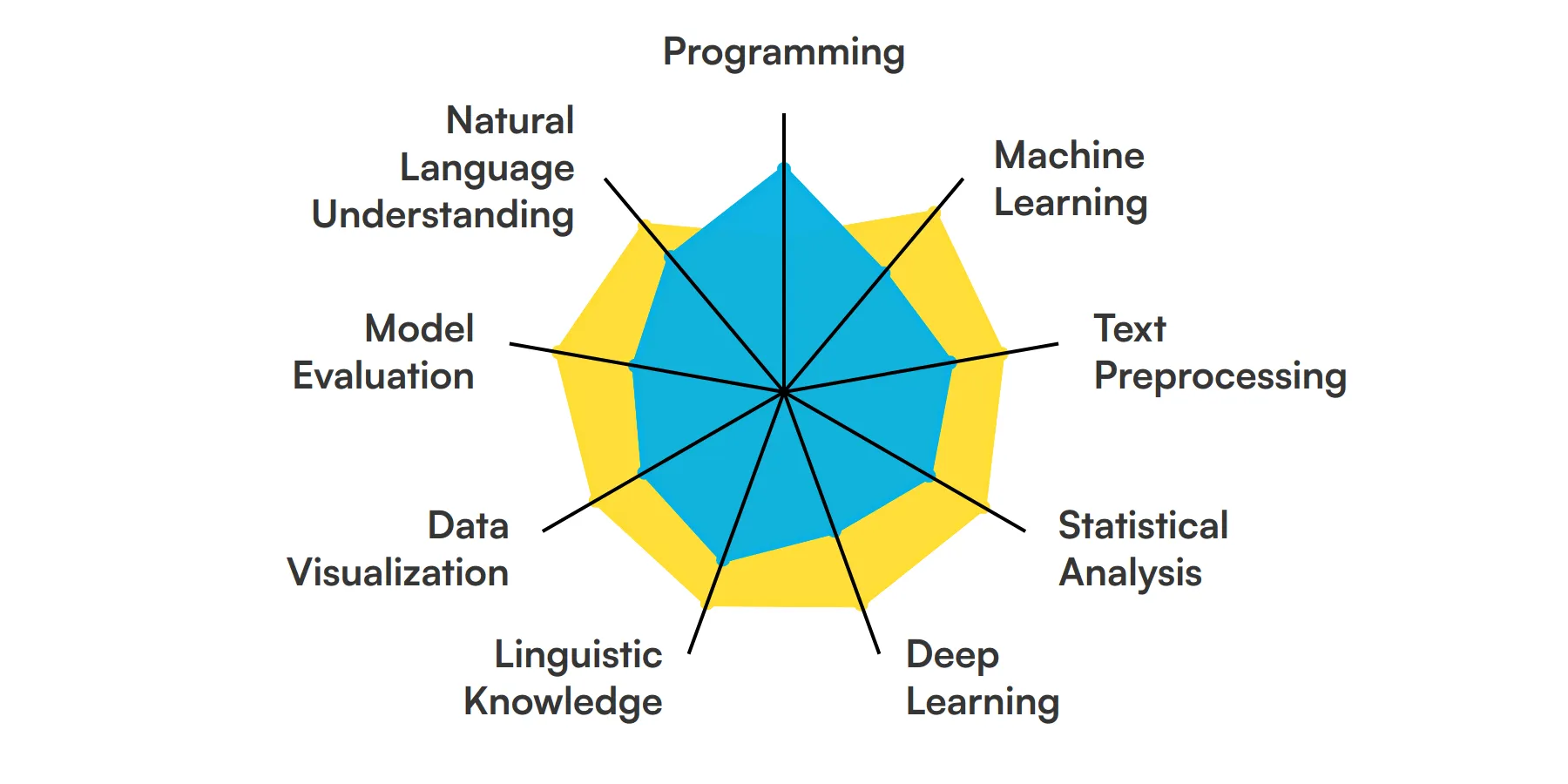
Programming
A strong grasp of programming languages like Python is fundamental for an NLP Engineer. You'll be writing scripts, developing algorithms, and implementing models to process and analyze natural language data.
For more insights, check out our guide to writing a Software Developer Job Description.
Machine Learning
Understanding machine learning concepts is crucial. You'll be training models, tuning hyperparameters, and evaluating performance to ensure your NLP solutions are effective and accurate.
Text Preprocessing
Skills in text preprocessing are necessary to clean and prepare raw text data. This includes tokenization, stemming, lemmatization, and removing stop words to make the data suitable for analysis.
Check out our guide for a comprehensive list of interview questions.
Statistical Analysis
Knowledge of statistical methods helps in understanding the underlying patterns in text data. You'll use statistical techniques to analyze word frequencies, co-occurrences, and other text features.
Deep Learning
Familiarity with deep learning frameworks like TensorFlow or PyTorch is important. You'll be building and training neural networks, such as RNNs and transformers, to handle complex NLP tasks.
Linguistic Knowledge
A solid understanding of linguistics can enhance your ability to develop more nuanced NLP models. This includes syntax, semantics, and phonetics, which are essential for tasks like parsing and sentiment analysis.
Data Visualization
Being able to visualize data helps in interpreting model results and communicating findings. Tools like Matplotlib or Seaborn are often used to create insightful visual representations of text data.
For more insights, check out our guide to writing a Data Scientist Job Description.
Model Evaluation
Evaluating the performance of NLP models is key. You'll need to understand metrics like precision, recall, F1 score, and confusion matrices to assess how well your models are performing.
Natural Language Understanding
This involves comprehending the intricacies of human language. You'll work on tasks like named entity recognition, sentiment analysis, and machine translation to make machines understand and generate human language.
10 secondary NLP Engineer skills and traits
The best skills for NLP Engineers include Version Control, Cloud Computing, APIs and Web Scraping, Database Management, Regular Expressions, Unix/Linux, Reinforcement Learning, Ethics in AI, Project Management and Domain Knowledge.
Let’s dive into the details by examining the 10 secondary skills of a NLP Engineer.
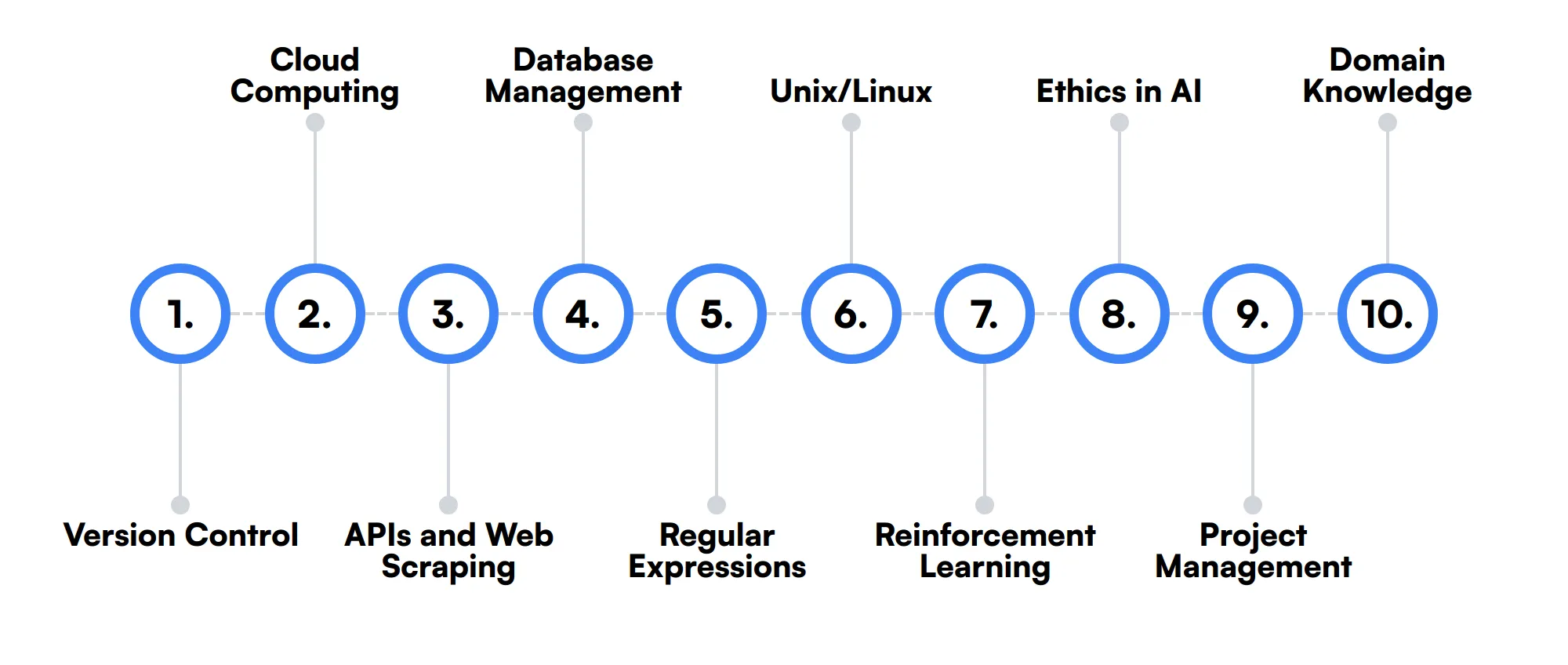
Version Control
Using version control systems like Git is important for collaboration and maintaining code history. It helps in tracking changes and managing different versions of your NLP projects.
Cloud Computing
Familiarity with cloud platforms like AWS or Google Cloud can be beneficial. These platforms offer scalable resources for training large NLP models and deploying them in production.
APIs and Web Scraping
Skills in using APIs and web scraping tools are useful for gathering text data from various sources. This can include social media, news websites, and other online platforms.
Database Management
Knowledge of database systems like SQL or NoSQL is helpful for storing and retrieving large volumes of text data. Efficient data management is crucial for handling extensive NLP datasets.
Regular Expressions
Proficiency in regular expressions is useful for pattern matching and text manipulation. This skill helps in extracting specific information from unstructured text data.
Unix/Linux
Comfort with Unix/Linux command line tools can streamline your workflow. You'll often use these tools for file manipulation, data processing, and running scripts.
Reinforcement Learning
Understanding reinforcement learning can be advantageous for certain NLP tasks like dialogue systems. It involves training models to make decisions based on rewards and penalties.
Ethics in AI
Awareness of ethical considerations in AI is important. You'll need to ensure that your NLP models are fair, unbiased, and respect user privacy.
Project Management
Basic project management skills can help in planning and executing NLP projects efficiently. This includes setting timelines, managing resources, and coordinating with team members.
Domain Knowledge
Having domain-specific knowledge can enhance the effectiveness of your NLP solutions. Understanding the context and nuances of the industry you're working in can lead to more accurate models.
How to assess NLP Engineer skills and traits
Assessing the skills and traits of an NLP Engineer can be a multifaceted task, given the diverse range of expertise required in this field. From programming and machine learning to deep learning and linguistic knowledge, an NLP Engineer must possess a broad skill set to excel. Understanding how to evaluate these skills effectively is key to finding the right candidate for your team.
Traditional resumes and interviews often fall short in providing a comprehensive view of a candidate's abilities. This is where skills-based assessments come into play. By leveraging tools like Adaface on-the-job skill tests, you can achieve a 2x improved quality of hires and an 85% reduction in screening time. These assessments are designed to evaluate a candidate's proficiency in key areas such as text preprocessing, statistical analysis, and natural language understanding, ensuring you find the best fit for your role.
Let’s look at how to assess NLP Engineer skills with these 6 talent assessments.
Python Online Test
The Python Online Test evaluates a candidate's ability to use Python data structures (strings, lists, dictionaries, tuples), manage files, handle exceptions and structure code using Object-Oriented Programming principles.
The test assesses their understanding of Python fundamentals, data structures, errors and exceptions handling, file operations, and OOP principles. It uses code-tracing and scenario-based MCQ questions to evaluate hands-on Python coding skills.
Successful candidates demonstrate proficiency in debugging tools, scripting and web scraping, and functional programming. They also show the ability to access and manipulate databases effectively.
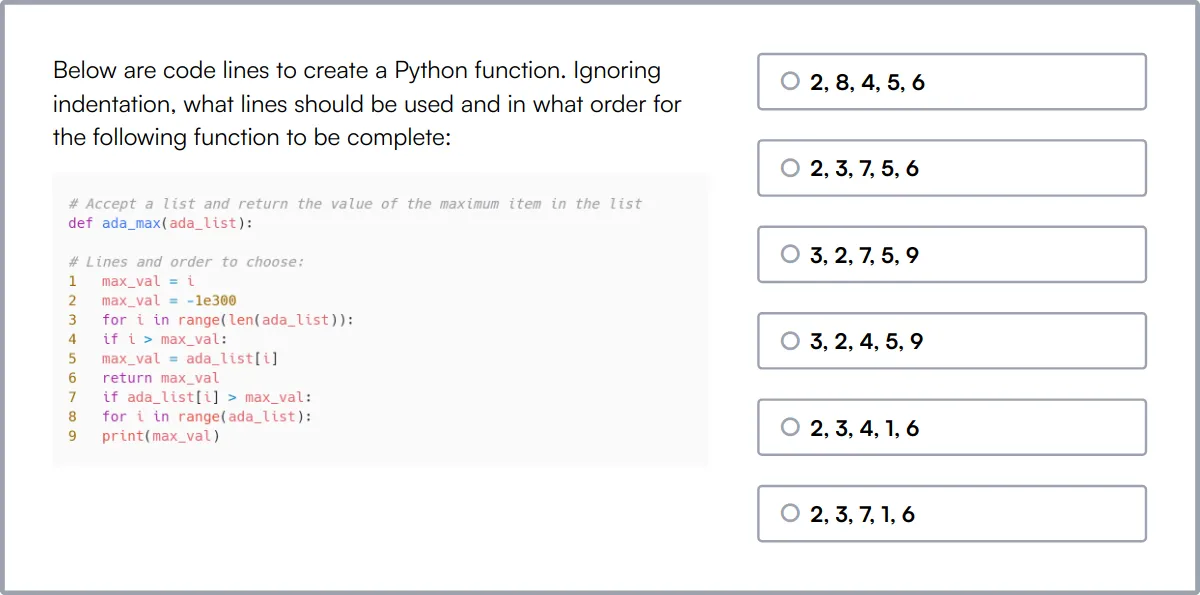
Machine Learning in AWS Online Test
The Machine Learning in AWS Online Test evaluates a candidate's knowledge and understanding of machine learning concepts and their application in the Amazon Web Services (AWS) environment.
The test assesses their understanding of machine learning in AWS, data science, data analysis, and Kubernetes. It focuses on their ability to leverage AWS services for implementing machine learning solutions.
Candidates who perform well demonstrate proficiency in AWS DevOps and the use of Python and its libraries for machine learning tasks.
Natural Language Processing (NLP) Test
The Natural Language Processing (NLP) Test uses scenario-based MCQs to evaluate candidates on their knowledge of NLP concepts and techniques.
The test assesses their understanding of tokenization, text classification, sentiment analysis, named entity recognition, and word embeddings. It evaluates their ability to apply NLP techniques to real-world problems and design effective NLP models.
High-scoring candidates show proficiency in language modeling, machine translation, information extraction, and text summarization.
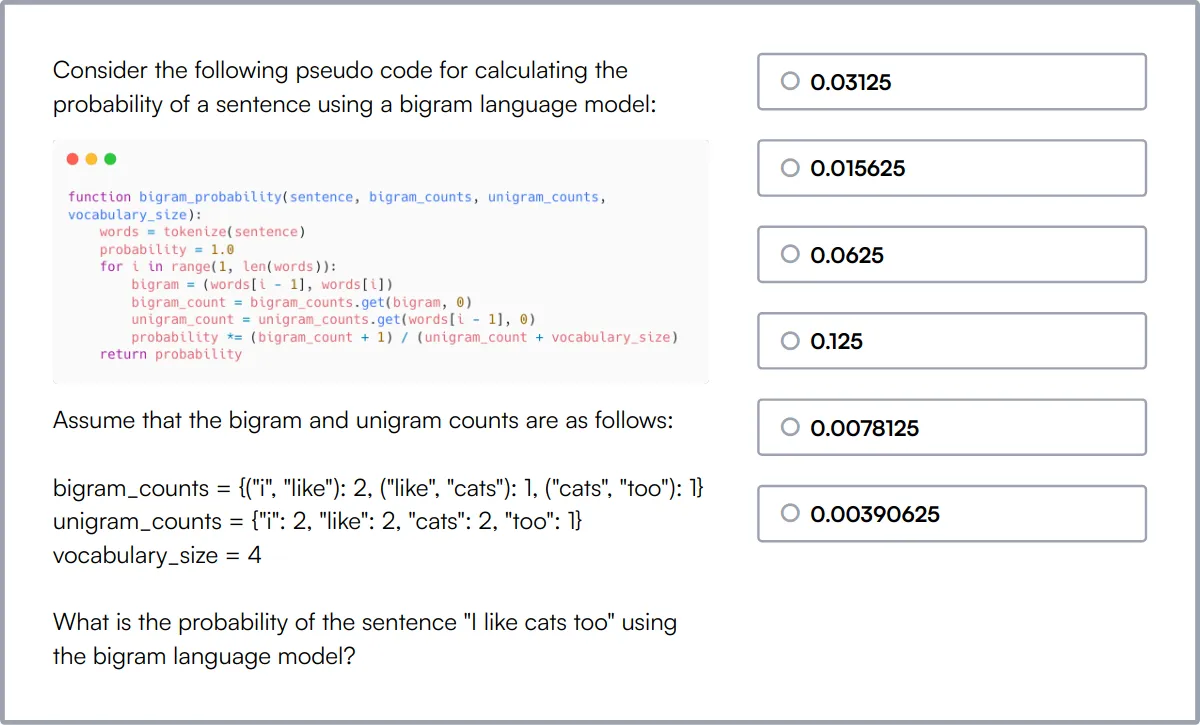
Statistics Test
The Statistics Test evaluates a candidate's understanding and proficiency in statistical concepts and analysis.
The test assesses their understanding of statistics fundamentals, inference, data sampling, regression, and exploratory data analysis. It covers statistical methods, data analysis, numerical reasoning, and quantitative aptitude.
Successful candidates demonstrate proficiency in non-parametric statistics, probability, and data analysis.
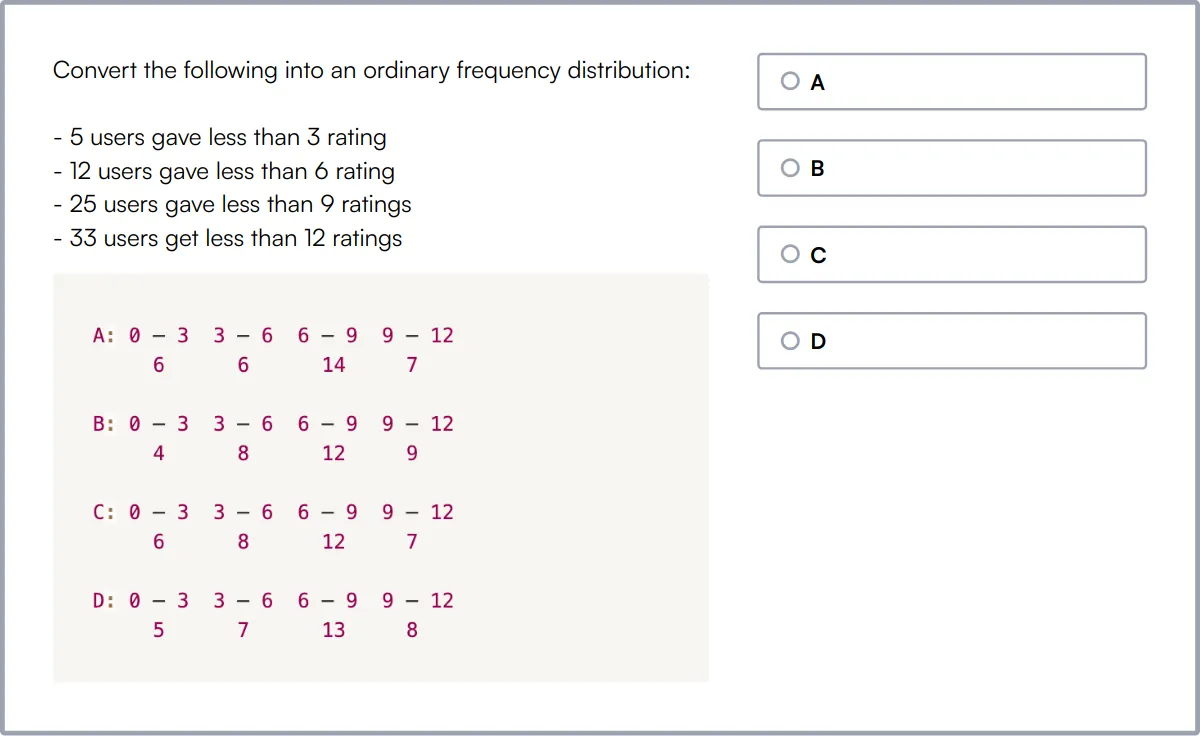
Deep Learning Online Test
The Deep Learning Online Test evaluates a candidate's understanding of core deep learning concepts like activation functions, backpropagation, RNNs & CNNs, learning rate, dropout, batch normalization, data processing pipelines, multi-layer perceptrons and data normalization.
The test assesses their understanding of neural networks, data normalization, cost functions and activation functions, backpropagation, and optimization algorithms. It also focuses on their ability to apply deep learning algorithms to use cases like computer vision, image recognition, object detection, and text classification.
Candidates who perform well demonstrate proficiency in convolutional neural networks, recurrent neural networks, generative adversarial networks, transfer learning, and autoencoders.
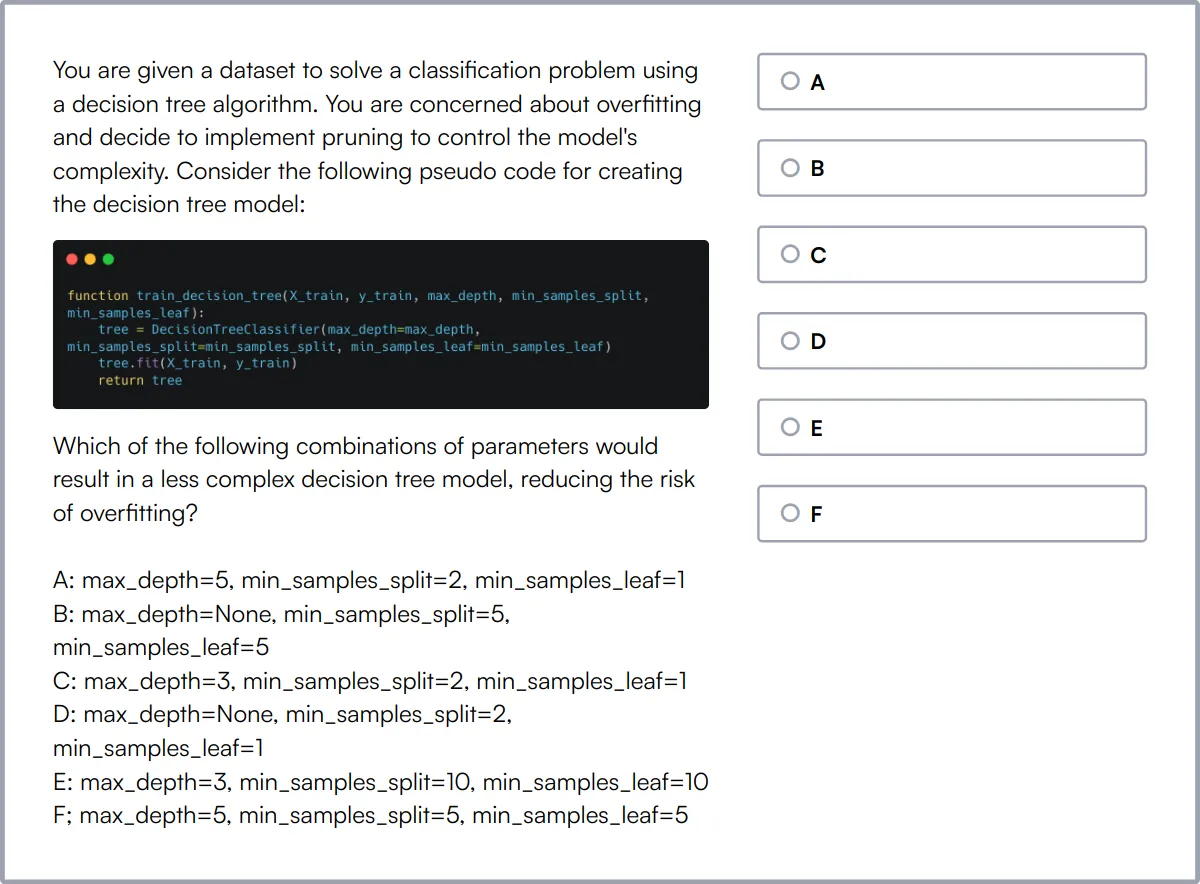
Data Analytics in Azure Online Test
The Data Analytics in Azure Online Test evaluates a candidate's knowledge and skills in utilizing Azure services for data analytics tasks.
The test assesses their understanding of data analytics fundamentals, Power BI, SQL Server, and data warehouse. It covers topics such as the Azure platform and data analysis techniques.
Successful candidates demonstrate proficiency in using Azure services for data analytics and show a strong understanding of data analysis techniques and data warehousing.
Summary: The 9 key NLP Engineer skills and how to test for them
| NLP Engineer skill | How to assess them |
|---|---|
| 1. Programming | Evaluate proficiency in writing and debugging code. |
| 2. Machine Learning | Assess ability to build and optimize ML models. |
| 3. Text Preprocessing | Check skills in cleaning and preparing text data. |
| 4. Statistical Analysis | Gauge understanding of statistical methods and their application. |
| 5. Deep Learning | Measure expertise in designing and training neural networks. |
| 6. Linguistic Knowledge | Evaluate understanding of language structure and semantics. |
| 7. Data Visualization | Assess ability to present data insights visually. |
| 8. Model Evaluation | Check skills in assessing model performance and accuracy. |
| 9. Natural Language Understanding | Gauge ability to interpret and process human language. |
Natural Language Processing (NLP) Test
NLP Engineer skills FAQs
What programming languages should an NLP Engineer know?
NLP Engineers should be proficient in Python and R. Familiarity with Java, C++, or Julia can be beneficial for certain projects.
How can I assess an NLP Engineer's machine learning skills?
Evaluate their understanding of algorithms, ability to implement models, and experience with libraries like scikit-learn, TensorFlow, or PyTorch.
Why is text preprocessing important in NLP?
Text preprocessing is crucial for cleaning and preparing raw text data, which improves the performance of NLP models. Look for experience with tokenization, stemming, and lemmatization.
What statistical analysis skills are needed for NLP?
NLP Engineers should understand probability, distributions, hypothesis testing, and statistical significance. Proficiency in tools like NumPy and pandas is also important.
How do you evaluate an NLP model?
Assess model performance using metrics like accuracy, precision, recall, F1-score, and AUC-ROC. Familiarity with cross-validation and confusion matrices is also important.
What role does deep learning play in NLP?
Deep learning techniques, such as neural networks and transformers, are used for tasks like language modeling, text generation, and sentiment analysis. Experience with frameworks like TensorFlow or PyTorch is essential.
How important is linguistic knowledge for an NLP Engineer?
Linguistic knowledge helps in understanding language structure and semantics, which is crucial for developing effective NLP models. Look for familiarity with syntax, semantics, and pragmatics.
What tools are used for data visualization in NLP?
Common tools include Matplotlib, Seaborn, and Plotly. These tools help in visualizing data distributions, model performance, and other insights.

40 min skill tests.
No trick questions.
Accurate shortlisting.
We make it easy for you to find the best candidates in your pipeline with a 40 min skills test.
Try for freeRelated posts
Free resources



